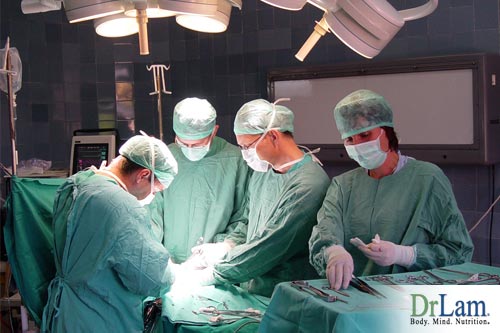 There are many people suffering from cancer that want the opportunity to try natural cancer treatments that work. Over the past 80 years, the war on cancer has been fought with 3 tools: surgery (cut), radiation therapy (burn), and chemotherapy (poison). Over the same period, there have been rapid improvements in technology and medical science. As such, one would expect the quality of medical treatments and the success rates for cancer to rise steadily. But have they? The answer may surprise you, and it has lots of people looking for additional therapies that might help.
There are many people suffering from cancer that want the opportunity to try natural cancer treatments that work. Over the past 80 years, the war on cancer has been fought with 3 tools: surgery (cut), radiation therapy (burn), and chemotherapy (poison). Over the same period, there have been rapid improvements in technology and medical science. As such, one would expect the quality of medical treatments and the success rates for cancer to rise steadily. But have they? The answer may surprise you, and it has lots of people looking for additional therapies that might help.
The search for natural cancer treatments that work is ongoing. Unfortunately, this problem is likely to continue and even worsen in the future. Since 1950, the overall cancer incidence has increased by 44% with breast cancer and male colon cancer A increasing by 60% and prostate cancer increasing by 100%. Furthermore, 44% of Americans are expected to develop cancer in the near future.
For many decades, the 5-year survival term has remained constant for non-localized breast cancer at 18% and lung cancer at 13%. Overall, the average cancer patient today has a 50% chance of living another 5 years, which is exactly the same odds he or she had back in 1971. At this stage, there are no artificial or natural cancer treatments that work well enough to save everyone.
45 billion dollars have been spent over the past few decades on cancer research. While the National Cancer Institute (NCI) claims that the 5 year survival rate (definition of a cure) has increased from 20% in the year 1930 to 53% in adults and 70% in children currently, critics of the NCI claim that this increase has more to do with earlier diagnosis and not the therapeutic modalities used.
Between the years of 1973 to 1987, diagnosis of specific types of cancer have increased:
Over 30 years (1960-62 to 1990-92), the death rates of certain types of cancer have actually increased. This includes:
Certain death rates have dropped over this time however, including:
What this indicates is that the cancer death rate, after adjusting for changes in the size and composition of the population, has increased by 7% between the years of 1975 and 1990. What this doesn’t reflect, however, is the increased rate of cancer diagnoses. In the past, many people died from cancer that went unidentified. Modern diagnostics have probably reduced this death rate significantly.
Modern oncology (the study of tumors) was founded based on the Halstead theory of cancer developed by W.S. Halstead. Halstead lived from 1852 to 1922. His primary focus was on the tumor and not on the patient as a living organism. Under this hypothesis, the removal of the tumor should remove the disease and cure the patient. But, if this theory is true, why does the age-adjusted mortality rate for breast cancer remain unchanged for the past 50 years despite advances in surgical techniques and aggressive cancer debulking operations? Halstead's theory is incomplete because its emphasis is on the tumor and ignores the patient. He looks at the tumor as the disease in and of itself, disregarding the overall body as a contributing factor.
While conventional medicine treats cancer as a focal disease with localized symptoms, naturally oriented physicians think otherwise. They view the body as a closed internal ecosystem and believe that the dysfunction of this ecosystem leads to the development of cancer.
No treatment can completely eliminate all cancer cells according to the naturally oriented physician. The reason is simple. Cancer is a systemic disease, and there are simply too many cancerous or pre-cancerous cells within the ecosystem of the body. Cancer is not a localized problem but a whole-body phenomenon of metastatic growth. Its growth process is affected by biological conditions. Non-genetically based cancer forms in the body because of toxins, the lack of oxygen, poor nutrition, and other factors such as hormonal imbalance. Whether cancer in our body continues to multiply depends to a large degree on our body's biological terrain. It is this terrain that determines how the cancer is expressed.
 Naturally oriented doctors often view cancer as a chronic, systemic and metabolic dysfunction of the body. Tumors are only the symptom of underlying problems. The root of cancer, therefore, lies in the progress of growth and metastasis, and not the tissue in which the tumor was first detected.
Naturally oriented doctors often view cancer as a chronic, systemic and metabolic dysfunction of the body. Tumors are only the symptom of underlying problems. The root of cancer, therefore, lies in the progress of growth and metastasis, and not the tissue in which the tumor was first detected.
The naturally oriented doctor, therefore, fights cancer by optimizing the internal terrain and enabling the patient's internal system to destroy the tumor. This approach may enhance the patient's health so that cancer cells cannot grow and multiply. There may be some benefits to this approach, and it’s worth talking to a naturally oriented doctor about improving the overall condition of your body. However, natural medical care shouldn’t interfere with or delay more conventional therapies that actually get results. Because the truth is that, at this stage, there are no natural cancer treatments that work to destroy or reduce cancer cells or tumors.
It’s vitally important that you don’t delay or otherwise put off going to your doctor and undergoing conventional cancer treatments in favor of natural alternatives. At this stage, there is no evidence that there are any natural cancer treatments that work to reverse or remove cancer. Delaying conventional treatments will only put you at a higher risk of the cancer spreading and perhaps even threatening your life.
If you’re going to try natural therapies in conjunction with conventional treatments, then discuss it with your doctor first. This will ensure that you don’t try anything that could interfere with or interact with your conventional treatment. Some natural therapies on the market at the moment can be dangerous, and this strategy will ensure that you avoid those options.
Supposed experts talk a lot about natural cancer treatments that work. However, these therapies are often unproven, and some can be dangerous for people with cancer. Most of the evidence for them is anecdotal and doesn’t take into account other interventions that may have impacted the cancer growth. Here are some therapies to avoid:
Laetrile is a purified form of amygdalin, which is extracted from apricot pits and certain nuts and plants. It first became popular in the United States and Russia as a cancer therapy. In the body, Laetrile is broken down to create cyanide. Proponents of this therapy claim that the cyanide then kills the cancer cells.
This is a very dangerous therapy. Cyanide doesn’t target cancer cells, and it’s actually very toxic. In trials, it didn’t reduce cancer cells but did make the participants very sick. This therapy could actually be fatal, so avoid at all costs.
Another idea is that changing the pH level of your body can make the environment inhospitable to cancer cells. This is based on the idea that cancer cells prefer an acidic environment, and so acidic foods raise cancer risk while alkaline foods could actually discourage the growth of cancer cells. So, there is a lot of support for an alkaline diet as one of the few cancer treatments that work.
This theory has a number of issues including:
So basically, this idea won’t work. An alkaline diet may temporarily change the pH of your saliva and urine, but your body pH levels won’t change. And if you do manage to change your body’s pH levels significantly, it could be very dangerous and possibly fatal.
There is no evidence at this stage that cannabis oil, which is extracted from marijuana plants, can destroy or shrink cancer cells. It has been approved for use in certain areas for alleviating symptoms of cancer treatment, however. This therapy isn’t dangerous, but it doesn’t replace traditional therapies either.
This is another common cancer therapy, and it’s based on the idea that receiving bee venom can kill cancer cells. However, if you have an undetected allergy, it can also kill you.
Some sources recommend extreme diets for cancer patients. Often these diets are based around the idea that cancer cells feed on sugar and that removing sugar will ‘starve’ the cancer cells. This idea is extremely flawed. Every cell in your body needs some type of sugar to function. So starving yourself of sugar can lead to metabolism disruptions, weight loss, malnutrition, and impede more effective cancer therapies. So, this approach should be avoided as well.
Being diagnosed with cancer can be terrifying and stressful. That’s why you need to be especially skeptical about claims of cancer treatments that work and not let a search for alternatives impede the care you need.
 There are natural cancer treatments that work, but they need to be used in conjunction with more traditional therapies. These therapies won’t destroy cancer cells or tumors, but they can help to lessen symptoms of the treatments and improve your overall experience. Make sure you talk to your doctor before trying any of these options first:
There are natural cancer treatments that work, but they need to be used in conjunction with more traditional therapies. These therapies won’t destroy cancer cells or tumors, but they can help to lessen symptoms of the treatments and improve your overall experience. Make sure you talk to your doctor before trying any of these options first:
Caution is absolutely essential when you’re looking for natural cancer treatments that work. Receiving a cancer diagnosis can be traumatic and devastating, and it’s tempting to grasp onto any source of hope, no matter how unsound. You should always talk to a doctor about conventional treatment first and without delay. However, if you want to improve the condition of your body and give yourself the best chances of beating the cancer, there are some natural therapies that may complement more conventional treatments. If you want to try these, then here’s how to do it safely:
If you want help with managing your health, click here or call our team at +1 (626) 571-1234.
© Copyright 2008-2020 Michael Lam, M.D. All Rights Reserved.
